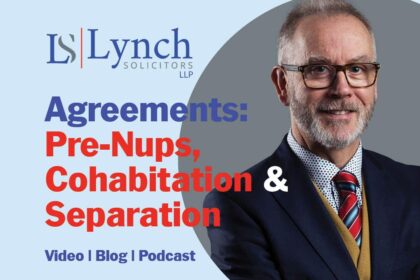
Pre-nups and other agreements are no longer the preserve of the rich and famous. They are becoming increasingly popular among couples. There are various agreements that you should consider putting in place if you are contemplating legal relationships.
A Prenuptial Agreement?
Prenuptial agreements have been labelled as “an insurance policy against falling out of love”.
A Prenuptial Agreement can be entered into by a couple who are intending to marry.
It usually sets out their rights on any property, debts, income, and other assets purchased together or that they have brought into a relationship.
In addition to property and assets, an agreement can deal with issues such as succession rights, children, custody access, maintenance, and pension.
Why Do A Prenuptial Agreement?
Many parties do a Prenuptial Agreement is to try to avoid disputes if they separate.
A Pre-nuptial Agreement is a way of pre-empting a forced division of assets on a breakup.
Who Enters Into Prenuptial Agreements?
Pre-nups are not only entered into by the rich and famous.
Couples of modest means are increasingly turning to prenuptial agreements in order to protect their assets.
It is often the case that business or farming enterprises look to protect family assets on the marriage of a family member.
Are Pre-Nups Enforceable?
The best answer under the current legal regime is that prenuptial agreements are not illegal or unenforceable in Ireland.
The Irish Courts have generally taken the view that prior agreements should be respected.
The primary duty of the Irish Courts under our Constitution is to ensure that proper provision is made for all family members on a breakup.
If a Prenuptial Agreement is considered by a Court to make proper provision it is less likely that the Court will set it aside.
Video: Pre-Nups, Cohabitation & Separation Agreements
Lynch Solicitors for Information Purposes Only
A Cohabitation Agreement?
A Cohabitation Agreement is an agreement, between people who are not married but living together, to provide for financial and other matters during their relationship or at the end of the relationship (whether on death or otherwise).
Anyone can enter into a cohabitation agreement.
Independent legal advice should be sought to ensure one party is not acting under duress.
A Co-ownership Agreement?
Anyone who is buying a property with another person, whether they are a family member or a friend, should have a Co-ownership Agreement with your co-purchaser.
A Co-ownership Agreement is a legal agreement between two or more people who have bought or who are in the process of buying an asset together. The Co-ownership Agreement will be tailored to suit the needs of the people who are buying the property
One of the main advantages of the Co-ownership Agreement is that it records exactly the contributions that have been made by each of the purchasers, not only to the purchase price but also to legal fees and any other expenses e.g. Engineer. This information can then be used to ensure that each person becomes registered as the owner of a share in the property that reflects the contribution that they have made.
If I Want To Sell My Share What Can I Do?
The agreement may stipulate that your share must first be offered for sale to your co-owner. If your co-owner wishes to acquire your share in the asset, a price will have to be agreed and the mechanism for that will be set out in the Agreement.
If your co-owner does not want to buy your share or cannot raise the finance to purchase the share then the Agreement, more often than not, will have a clause stating that the entire property will be put on the open market for sale.
What Happens If One Of The Owners Dies?
The Agreement may allow for the surviving owner to acquire the share of the deceased owner. It may stipulate that the person acquiring the share can agree a fair (usually market) price for the share that they are acquiring. If the owner and the Executor of the deceased owner cannot agree upon a price, the Agreement sets out a mechanism for an independent valuation which will be binding on both sides.
And Finally…
It is always advisable to have agreements on a relationship – business or otherwise.
It can concentrate minds at the time and prevent problems if and when the relationship ends.
We can help if you find yourself in a situation like this. Contact us on 052 6124344, email us: reception@lynchsolicitors.ie, or complete the form on this page.
Click here to read our guide to marital breakdown.
Podcast: Whan A Marriage Breaks Down
ATTENTION
The material contained in this blog is provided for general information purposes only. We advise you to seek specific advice from us about any legal decision or course of action.

